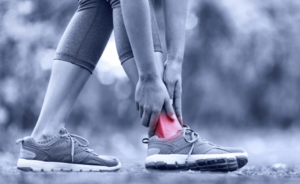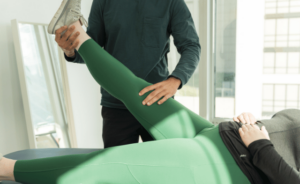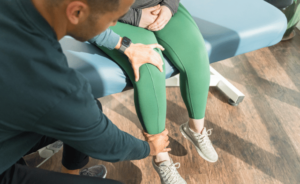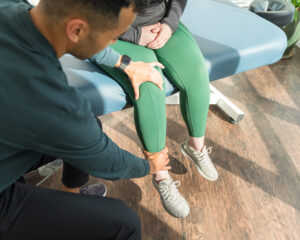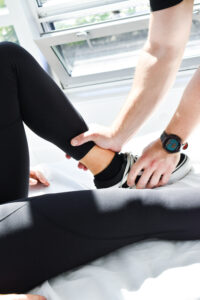In the bustling streets of downtown Vancouver, car accidents are an unfortunate reality for many. The aftermath can be challenging, especially for those who experience concussions, a common yet often misunderstood injury. At Vancouver Physiotherapy Hub, we specialize in targeted vestibular physiotherapy to support concussion recovery and help patients navigate their path back to normalcy. For anyone in a motor vehicle accident and going through ICBC, please see our PAARCC program.
For Vestibular treatments, we recommend the following:
Understanding Concussions
A concussion is more than just a blow to the head; it’s a type of traumatic brain injury that can disrupt your brain’s normal functioning. The effects can be multifaceted, affecting physical, cognitive, and emotional health. Patients may experience a range of symptoms that can significantly impact their daily life, including:
Dizziness and Balance Issues: Dizziness and balance issues after a concussion often result from disruptions in the vestibular system, located in the inner ear, which is crucial for maintaining balance and spatial orientation. The impact can damage the delicate inner ear structures or neural pathways, leading to sensations of spinning (vertigo) and unsteadiness. Additionally, the cerebellum, which coordinates movement and balance, may be affected, causing difficulties in maintaining stability and control over movements.
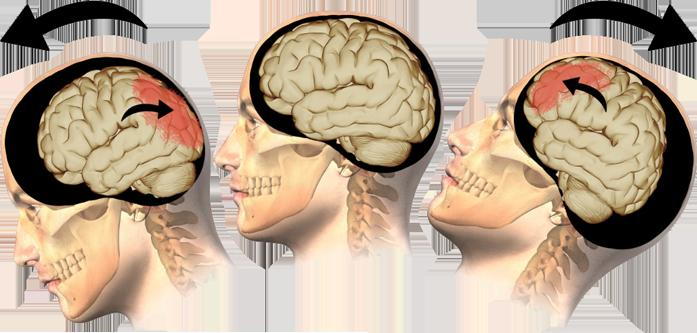
Visual Disturbances: Visual disturbances following a concussion are typically due to damage to the visual pathways or the occipital lobe, which processes visual information. Symptoms such as blurred vision, difficulty focusing, and sensitivity to light (photophobia) occur because the brain’s ability to interpret visual stimuli is impaired. The oculomotor system, responsible for eye movement, can also be affected, leading to double vision (diplopia) and trouble tracking moving objects.
Cognitive Impairments: Cognitive impairments from a concussion often involve difficulties with concentration, memory, and information processing. These issues arise because the injury can disrupt the neural networks in the frontal and temporal lobes, which are critical for these cognitive functions. The brain’s reduced efficiency in processing and retrieving information can make tasks that require mental effort more challenging and time-consuming.
Emotional Changes: emotional changes following a concussion can include increased irritability, mood swings, and personality changes. These symptoms are often due to damage or disruption in the brain regions that regulate emotions, such as the frontal lobe and the limbic system. The injury can affect neurotransmitter levels, leading to altered emotional responses and difficulty managing stress or emotions.
Physical Symptoms: physical symptoms of a concussion commonly include headaches, nausea, fatigue, and sleep disturbances. Headaches can result from the brain’s direct impact against the skull, causing bruising or swelling. Nausea and fatigue are often due to the brain’s overall stress response, while sleep disturbances can arise from disruptions in the brain’s regulatory mechanisms for sleep-wake cycles.
These symptoms not only hinder an individual’s ability to perform everyday tasks but can also prolong their return to work, social activities, and recreational pursuits, especially in an active community like downtown Vancouver.
The Mechanism Behind Concussions
A concussion is a type of traumatic brain injury (TBI) that occurs when a sudden impact or jolt to the head causes the brain to move rapidly back and forth within the skull. This movement can result in the brain colliding with the inner walls of the skull, leading to bruising, neural damage, and disruption of brain function. The impact can stretch and damage neural pathways and disrupt the balance of neurotransmitters, causing a range of symptoms such as dizziness, balance issues, headaches, and cognitive impairments.
How Can Vestibular Physiotherapy Help Your Concussion
What is Vestibular Physiotherapy?
Vestibular physiotherapy is a specialized form of therapy aimed at addressing dizziness, balance disorders, and other symptoms related to vestibular system dysfunction. This system, located in the inner ear, plays a crucial role in maintaining balance and spatial orientation. Vestibular physiotherapy involves exercises and techniques designed to retrain the brain and the vestibular system to compensate for any damage or dysfunction caused by a concussion.
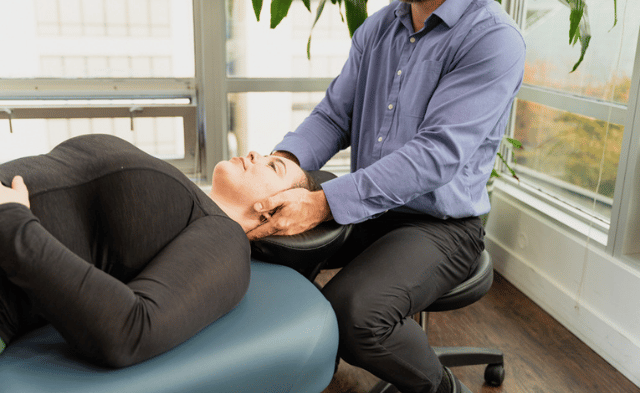
Six Ways Vestibular Physiotherapy Helps Concussion Recovery
At Vancouver Physiotherapy Hub, we employ a comprehensive approach to vestibular rehabilitation, tailored to each patient’s unique symptoms and recovery goals. Here are six ways vestibular physiotherapy can assist concussion patients:
#1 – Personalized Balance Training
A concussion disrupts the vestibular system, which can lead to dizziness and a feeling of instability.
Our physiotherapists work with you to develop personalized balance training, which involves designing customized exercises tailored to challenge and improve your balance system. These exercises may include tasks like standing on one leg, using balance boards, or performing movements that stimulate the vestibular system, helping to retrain it and reduce feelings of dizziness and instability. By focusing on individual needs, this approach ensures that specific deficits are addressed, promoting more effective recovery.
#2 – Visual-Vestibular Integration
Following a concussion, many patients report visual disturbances such as blurred vision, difficulty focusing, and increased sensitivity to light.
Our physiotherapists integrate visual-vestibular exercises to improve the coordination between your vision and your balance by incorporating activities that require simultaneous visual and vestibular input. For example, exercises might involve tracking moving objects with your eyes while moving your head in different directions. This helps enhance the brain’s ability to process visual and vestibular information together, reducing visual strain and improving overall focus.
#3 – Gaze Stabilization
Concussions can impair the oculomotor system, leading to difficulties with gaze stabilization, where the eyes struggle to maintain a steady focus on a target. This impairment contributes to dizziness and vertigo.
Using gaze stabilization exercises, our vestibular physiotherapists can help retrain the eyes and brain to work together more effectively, reducing these symptoms. These exercises typically involve fixing your gaze on a stationary object while moving your head side to side or up and down. By repeatedly practicing these movements, the brain strengthens its ability to control eye movements and stabilize your vision, thereby improving your ability to focus and process visual information more accurately.
#4 – Cognitive Rehabilitation
Cognitive impairments, such as difficulties with concentration, memory, and information processing, are common after a concussion due to the disruption of neural networks in the frontal and temporal lobes.
Our physiotherapists incorporate dual-task exercises that combine physical movements with cognitive tasks. For instance, you might be asked to perform a physical activity, like walking, while simultaneously solving a math problem or recalling a list of words. This approach helps enhance neuroplasticity—the brain’s ability to reorganize and form new connections—thereby improving cognitive functions. This dual-task training is particularly effective in facilitating a smoother return to work and daily activities by addressing both physical and cognitive aspects of recovery.
#5 – Education and Coping Strategies
Understanding the nature of a concussion and how to manage its symptoms is crucial for effective recovery. Our physiotherapists provide education on the mechanisms of concussion, typical symptoms, and the expected recovery process. Additionally, we offer coping strategies to help manage symptoms at home and in the workplace. This might include tips for pacing activities to avoid overexertion, techniques for managing stress, and advice on creating a conducive environment for recovery. By equipping patients with this knowledge, we empower them to take an active role in their rehabilitation and improve their quality of life.
#6 – Graduated Return to Activity
After a concussion, it’s important to gradually reintroduce physical activities to avoid exacerbating symptoms. We work alongside you and design a treatment plan for you to safely regain confidence in your physical abilities. This involves a step-by-step approach, starting with light activities and progressively increasing intensity and complexity as symptoms allow. We carefully monitor progress and adjust the plan as needed to ensure a safe and effective return to recreational activities. This gradual approach helps prevent setbacks and ensures that patients in our active Vancouver community can resume their preferred activities without compromising their recovery.
Tailored Care in the Heart of Vancouver
Located in downtown Vancouver, BC, Vancouver Physiotherapy Hub is ideally situated to serve the city’s bustling community. Whether you’re a busy professional, a student, or an outdoor enthusiast, our clinic is accessible and ready to support your recovery journey. Our team of experienced physiotherapists is deeply committed to providing compassionate, patient-centered care, leveraging the latest in vestibular rehabilitation techniques to help concussion patients reclaim their lives.
Concussions can derail lives, but with the right support and rehabilitation, recovery is within reach. Vestibular physiotherapy offers a beacon of hope, providing effective strategies to manage and overcome the dizzying array of symptoms that concussions can bring. At Vancouver Physiotherapy Hub, we’re dedicated to guiding you through every step of your recovery, helping you return to the vibrant, active lifestyle that downtown Vancouver offers. If you’ve been affected by a concussion following a car accident, our doors are open, and our expert team is here to help you navigate the road to recovery.

